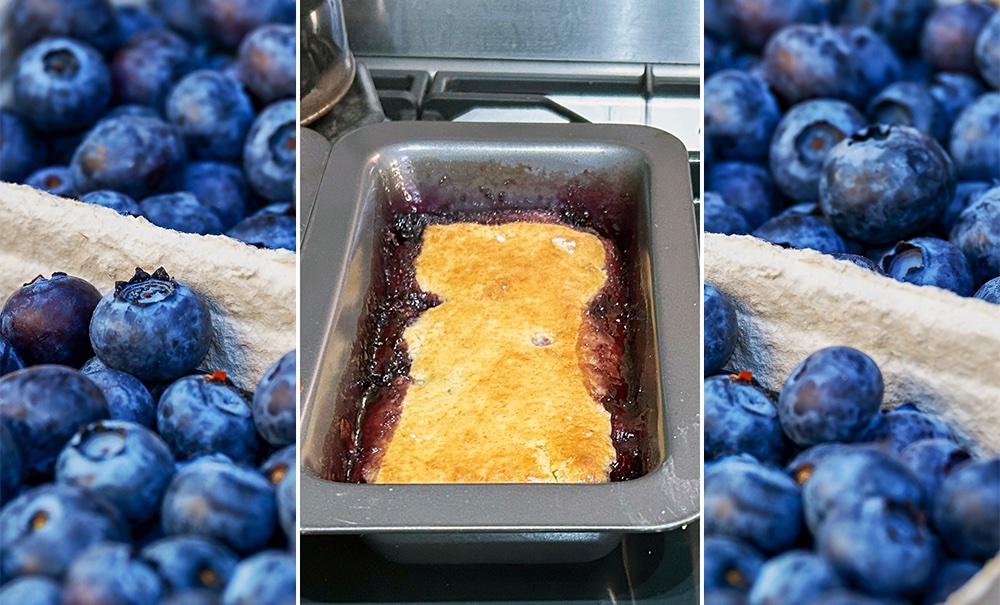My native Canadian province of Nova Scotia is the blueberry capital of the world. The world’s number-one exporter of wild blueberries, the fruit is literally baked into the DNA and culture of the province.
One upshot is the “blueberry grunt”, which is a variation on a cobbler — effectively, fruit baked under a dough topping with lots of sugar or sugary substitutes thrown in.
For example, in the US South, peach cobblers are extremely popular. In fact, from my time as a journalist in Dallas, I can reliably say that it was the most popular desert item chosen by death row inmates in Texas for their last meal. Filing reports on executions – a grim task, it must be said – was my first taste of the cobbler concept.
But then I realised, “oh, it’s like a grunt”. The concepts can get cobbled up.
Up in the more civilised north, where I hail from, the death penalty has long since been abolished and while peaches can grow in such climes, blueberries absolutely flourish.
My late mother was a keen picker of wild blueberries in the woods – one of the rituals of summer in Nova Scotia – but as she got older and less mobile she settled for cultivated varieties in her yard.
 Blueberries on the vine in Ed Stoddard’s mother’s Nova Scotia garden. (Photo: Ed Stoddard)
Blueberries on the vine in Ed Stoddard’s mother’s Nova Scotia garden. (Photo: Ed Stoddard)
I got stuck into making blueberry grunts during the final years of my mother’s life. If I happened to be back in Nova Scotia in August or September, one of my regular tasks with my mother was to pick blueberries from the prolific bushes in her backyard.
Almost every day’s pickings would yield a fresh litre or two of blueberries and what the hell do you do with this harvest, aside from giving much of it away to friends and family?
The reliable old blueberry grunt was the answer.
My mother was on a gluten-free diet for medical reasons, so I had to use gluten-free flour. Like most baked items, this is not a problem, but it also doesn’t taste as good, in my opinion.
One variation I experimented with recently was pouring Canadian maple syrup on the berries rather than sprinkling them with sugar, which I still used in the dough or batter mix.
I was not disappointed with the result and nor were my South African friends and family. I have found blueberry grunt, for whatever reason, to be a hit with South Africans, an affection perhaps partly explained by its relative novelty here.
My wife and I were visiting Nova Scotia in July and brought some Canadian maple syrup back with us. For most South Africans, this will not be an option, but honey can also be used.
And blueberries are far more abundant here than they once were. Fresh blueberries are best but frozen ones work just fine and are more cost effective. There is nothing quite like the taste of wild Nova Scotia blueberries, but anyway...
I typically serve blueberry grunt in a simple manner with ice cream. Vanilla seems to mix perfectly with the flavours but there is no need to limit your imagination on this front.
Ingredients
 Ed’s late mother’s blueberry grunt, photographed in 2019. (Photo: Ed Stoddard)
Ed’s late mother’s blueberry grunt, photographed in 2019. (Photo: Ed Stoddard)
3 cups blueberries, fresh or frozen – or wild if you’re lucky!
1 ½ cups white sugar, divided (or substitute 1 cup of sugar with ¾ of a cup of maple syrup or honey)
2 Tbsp baking margarine
1 egg
1 cup milk
1 ½ cups cake wheat flour
2 tsp baking powder
1 pinch salt
Method
Preheat the oven to 185°C.
Spread blueberries in the bottom of a casserole or baking dish; sprinkle 1 cup sugar over top or pour ¾ cup of maple syrup or honey evenly. I use two narrow dishes at a time and divide the ingredients 50/50 between them.
Cream together the baking margarine (such as Stork – Canadians use “shortening”), the remaining ½ cup of sugar and the egg with a whisk. Slowly add the milk, flour, baking powder and salt and give this a good beating and whisking until it is fairly evenly combined – a couple of lumps are acceptable.
Drop tablespoonfuls on top of the sugar- or syrup-covered blueberries.
Bake in the preheated oven until golden brown for at least 35 minutes. Some recipes call for a lower temperature or shorter time but I find that does not allow it to brown on top. Expect splotches of blueberries to bubble up on the sides.
It can be eaten hot out of the oven or after it has cooled. Serve with ice cream and, voila, a taste of Nova Scotia to follow your South African braai or potjiekos. DM
Canadian Ed Stoddard took time off from his reporting for Business Maverick to write this for TGIFood.




 Ed’s late mother’s blueberry grunt, photographed in 2019. (Photo: Ed Stoddard)
Ed’s late mother’s blueberry grunt, photographed in 2019. (Photo: Ed Stoddard)
